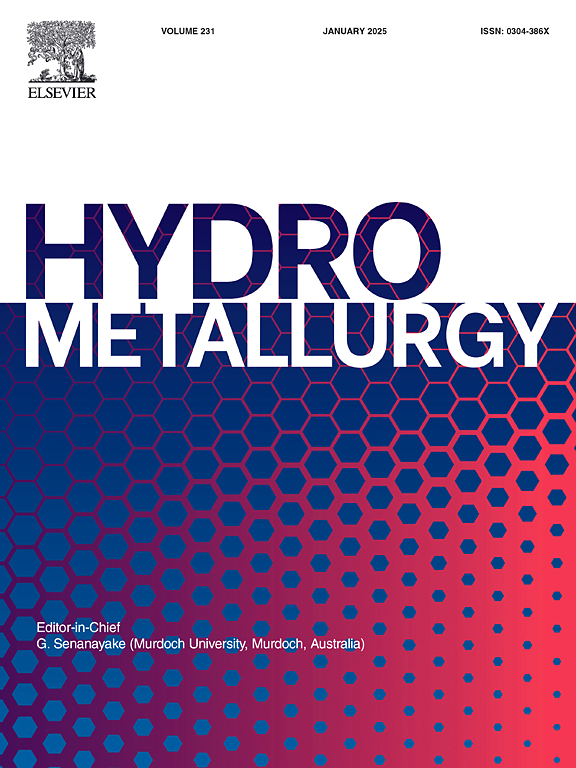利用还原焙烧、研磨、添加剂存在下的硫代硫酸盐浸出和磁选,从黄铁矿渣中回收金和氧化铁
IF 4.8
2区 材料科学
Q1 METALLURGY & METALLURGICAL ENGINEERING
引用次数: 0
摘要
作为一种常见的有害固体废物,硫铁矿渣(PyC)中含有铁和金等贵重金属,引起了人们的广泛关注。采用无氰萃取和磁选的环境友好方法,系统地研究了含金PyC中金和铁的回收。结果表明,在不进行还原焙烧的情况下,铜-氨-硫代硫酸盐体系萃取金的效率可达54.7%。在优化条件下,铁精矿铁含量为57.5%,铁回收率为83.1%。通过还原焙烧,获得了浸金率为67.0%、铁含量为65.1%、铁回收率为98.3%的优质精矿。x射线衍射、扫描电镜和能量色散x射线能谱分析表明,还原焙烧使赤铁矿转化为磁铁矿,提高了铁回收率和铁精矿质量。此外,还原焙烧在颗粒表面产生更多的多孔结构,从而提高了提金效率。因此,本研究为利用环保方法从PyC中回收Au和Fe提供了新的见解。本文章由计算机程序翻译,如有差异,请以英文原文为准。

Recovery of gold and iron oxide from pyrite cinder using reduction roasting, grinding, thiosulfate leaching in the presence of additives and magnetic separation
Despite being a common hazardous solid waste, pyrite cinder (PyC) contains valuable metals such as iron and gold, which has attracted considerable research attention. The recovery of gold and Iron from gold-bearing PyC was systematically investigated using an environmentally friendly approach involving non-cyanide extraction and magnetic separation. The results showed that with PyC not subjected to reduction roasting a maximum gold extraction efficiency of 54.7 % was achieved through a copper–ammonia–thiosulfate system. The iron concentrate was assayed at 57.5 wt% Fe with an iron recovery of 83.1 % under optimized conditions. By contrast, a gold extraction efficiency of 67.0 %, as well as a high-quality concentrate with Fe content of 65.1 wt% and Fe recovery of 98.3 %, were obtained via reduction roasting. X-ray diffraction and scanning electron microscopy coupled with energy-dispersive X-ray spectroscopy analyses revealed that reduction roasting transformed hematite into magnetite, improving both iron recovery and the quality of the iron concentrate. In addition, reduction roasting generated more porous structures on the particle surfaces, thereby enhancing the gold extraction efficiency. Hence, this study provides new insights into the recovery of Au and Fe from PyC using an environmentally friendly approach.
求助全文
通过发布文献求助,成功后即可免费获取论文全文。
去求助
来源期刊

Hydrometallurgy
工程技术-冶金工程
CiteScore
9.50
自引率
6.40%
发文量
144
审稿时长
3.4 months
期刊介绍:
Hydrometallurgy aims to compile studies on novel processes, process design, chemistry, modelling, control, economics and interfaces between unit operations, and to provide a forum for discussions on case histories and operational difficulties.
Topics covered include: leaching of metal values by chemical reagents or bacterial action at ambient or elevated pressures and temperatures; separation of solids from leach liquors; removal of impurities and recovery of metal values by precipitation, ion exchange, solvent extraction, gaseous reduction, cementation, electro-winning and electro-refining; pre-treatment of ores by roasting or chemical treatments such as halogenation or reduction; recycling of reagents and treatment of effluents.
 求助内容:
求助内容: 应助结果提醒方式:
应助结果提醒方式:


